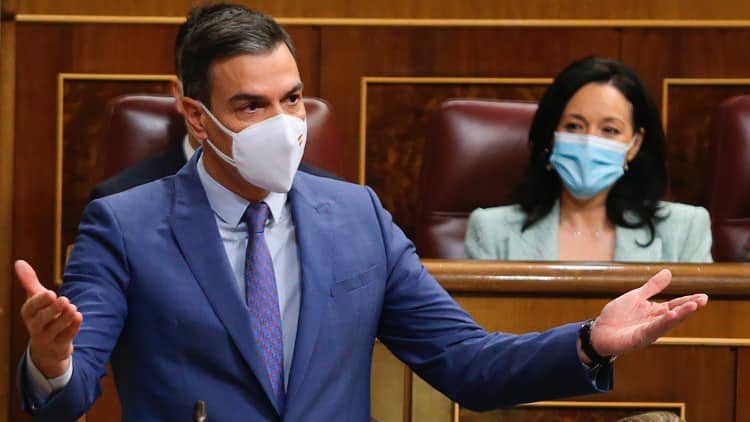Ángel Collado
After four years in power and at his worst moment according to the polls and the results of the regional elections in Madrid, Andalusia and Castile and Leon, Pedro Sánchez goes to Congress to lead the first debate on the State of the Nation that he has decided to call.
The President of the Government is planning the session that begins tomorrow in the Lower House as an attempt to relaunch his image with the advantage of not having to personally confront the head of the opposition, Alberto Núñez Feijóo, ahead in all the polls, because as he is not a member of parliament he will have to content himself with a press conference format.
Against the interests of the head of the Executive is the fact that the far-left and separatist parties that keep him in power will take advantage of the situation to make it clear that he owes them his position and that his continuity depends on his compliance with the agreed concessions.
If Sánchez wants to defend his general management, including his response to the crisis caused by the rise in inflation and energy prices, his partners in Podemos hope to mark differences with the social-communist cabinet of which they form part, especially in international policy, defence spending and social aid.
The second vice-president, Yolanda Díaz, is in the re-founding of the far-left political space headed by Pablo Iglesias and is postulated as his possible electoral heir with a friendlier image. From the cabinet, she is promoting herself by distancing herself from Sánchez’s pro-Moroccan turn and the increase in investment in defence, for the moment with the 1 billion approved by the executive plus the agreement with the United States for the Rota base to receive two more destroyers.
The internal differences within the government will be joined by the chorus of pro-independence allies, always dissatisfied despite Sánchez’s concessions. To palliate the protests of the Catalan secessionists, the head of the Executive has closed a meeting with the president of the Generalitat of Catalonia, Pere Aragonés, for next Friday, which is convened on an equal footing, as if the president of the Government of the Kingdom of Spain no longer represented the Catalans and the president of the Generalitat were not Spanish.
After pardoning the ERC leaders convicted and imprisoned for sedition and embezzlement in the separatist attempt of 1 October 2017, Sánchez has to take care of relations with his successors, Aragonés the first, who keep him in power with the 13 deputies they have in Congress. The pro-independence supporters want facilities to advance their project of rupture, the first impunity against the action of Justice, and even amnesty for their crimes.
Bildu, heir to the political arm of the terrorist group ETA, is the cabinet partner most satisfied with Sanchismo in power. After facilitating the majority of ETA members to serve sentences close to their places of origin and ceding the powers of these prisons to the Basque government for the future benefits of the gunmen, the government is now applying itself to whitewashing the so-called ‘nationalist left’ as if it were just another left-wing pro-independence formation in the ‘progressive’ parliamentary conglomerate that supports it.
To secure the support of the five Bildu MPs, Sánchez has just included in his law of democratic memory the theory that Francoism extends to 1983 and includes the first PSOE government (of Felipe González) in order to recognise the rights of the gang’s terrorists who died at the hands of the police.
Against the motley portrait of the groups that support the government will be in this debate the unusual case of the opposition party confirmed as an alternative, at least in the polls and all the regional elections held in the last year and a half. Its leader, Alberto Núñez Feijóo, will be there, but he will not be able to respond to Sánchez. As a senator, a member of the Upper House by designation of the Galician parliament, he will sit in the hemicycle in front of his deputies, but he will not speak because he is not a deputy.
It will be the PP spokeswoman in Congress, Cuca Gamarra, who will be in charge of replying to Sánchez from the rostrum. Feijóo will have to settle for a press conference afterwards, in which he will once again offer his recipes for dealing with the economic crisis that paralyses a government he accuses of always being behind the times, with patches that continue to have no effect whatsoever in the face of inflation.
The parliamentary debate, which will have more spectacle than practical content, will be decisive for the stability of the government, as it will show how Sánchez’s support for the end of the legislature stands before its next decisive test: the general state budgets that have to be processed in Congress from September onwards. They will be the first with adjustments and cuts.







